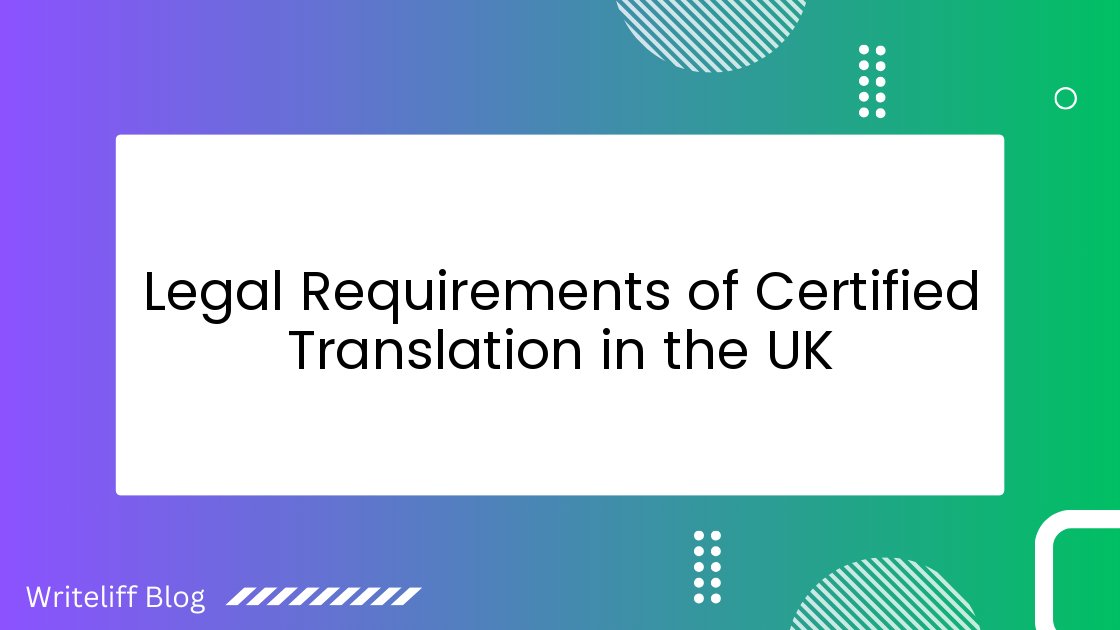Legal Requirements of Certified Translation in the UK

Have you ever wondered about the legal requirements for certified translations in the UK? Whether you’re dealing with official documents, legal papers, or important records, understanding the ins and outs of certified translation is crucial. In this article, we’ll dive into the world of certified translations, exploring what they are, why they’re important, and the legal requirements you need to know. So, let’s get started on this exciting journey through the world of certified translations in the UK!
What is a Certified Translation?
First things first, let’s break down what a certified translation actually is. Simply put, a certified translation is an official version of a document that’s been translated from one language to another. But here’s the kicker – it’s not just any old translation. A certified translation comes with a special statement from the translator or translation company, swearing that the translation is accurate and complete.
Think of it like this: if your original document is a fancy dress, the certified translation is that same dress, but tailored to fit a different body type. It looks different, but it’s still the same dress at its core.
Why Are Certified Translations Important?
Now, you might be wondering, “Why go through all this trouble? Can’t I just use Google Translate?” Well, not quite. Certified translations are super important for a bunch of reasons:
- Legal Recognition: Many official bodies, like courts and government agencies, only accept certified translations.
- Accuracy: Certified translations ensure that important details aren’t lost in translation.
- Credibility: They give your documents an extra layer of trustworthiness.
- Compliance: In many cases, certified translations are required by law.
Legal Requirements for Certified Translations in the UK
Alright, now let’s get to the meat of the matter – the legal requirements. In the UK, the rules around certified translations aren’t as strict as in some other countries. But there are still some important things to keep in mind:
- Qualified Translator: The translation must be done by a qualified professional translator. This doesn’t necessarily mean they need a specific certification, but they should have the skills and experience to do the job right.
- Certification Statement: The translation needs to come with a statement certifying its accuracy. This is usually attached to the translation.
- Original Document: In most cases, you’ll need to provide the original document along with the translation.
- Notarization: Some organizations might ask for the translation to be notarized. This means a notary public confirms the translator’s identity and signature.
It’s worth noting that different organizations might have their own specific requirements. For example, the UK Visas and Immigration department has its own guidelines for translations.
Who Can Provide Certified Translations?
Now, you might be wondering, “Who can I trust to do my certified translation?” Good question! In the UK, certified translations can be provided by:
- Professional translation companies
- Freelance translators
- Members of professional translation associations
One important thing to remember is that in the UK, there’s no such thing as a “sworn translator” like in some other countries. Instead, what matters is the translator’s qualifications and experience.
The Certification Process
So, how does a translation become “certified”? Here’s a simple breakdown of the process:
- The document is translated by a qualified translator.
- The translator adds a certification statement, usually including:
- Their name and contact details
- Their qualifications
- A declaration that the translation is accurate and complete
- The date of the translation
- Their signature
- The certification statement is attached to the translation.
- If required, the translation may be notarized.
Common Documents Requiring Certified Translation
You might be wondering what kinds of documents typically need certified translation. Here’s a list of some common ones:
- Birth certificates
- Marriage certificates
- Divorce papers
- Academic transcripts and diplomas
- Medical records
- Legal contracts
- Immigration documents
Remember, if you’re not sure whether you need a certified translation, it’s always best to check with the organization that’s asking for the document.
Costs and Timeframes
Now, let’s talk money and time. The cost of a certified translation can vary widely depending on factors like:
- The length of the document
- The complexity of the content
- The language pair (some languages are more expensive to translate than others)
- The urgency of the request
As for timeframes, a simple document might be translated and certified in a day or two, while more complex documents could take a week or more.
How Writeliff Can Help
If all this sounds a bit overwhelming, don’t worry! That’s where companies like Writeliff come in. We specialize in providing high-quality certified translation services that meet all the legal requirements in the UK. Our team of experienced translators can handle a wide range of documents, ensuring accuracy, confidentiality, and timely delivery.
Key Takeaways
- Certified translations are official, accurate translations of documents.
- They’re important for legal recognition, accuracy, and compliance.
- In the UK, certified translations need to be done by qualified translators and include a certification statement.
- Different organizations may have specific requirements for certified translations.
- Common documents needing certified translation include birth certificates, academic records, and legal papers.
- Costs and timeframes can vary depending on the document and urgency.
Final Thoughts
Navigating the world of certified translations in the UK doesn’t have to be complicated. By understanding the basics and requirements, you can ensure your important documents are properly translated and recognized. Remember, when in doubt, it’s always best to consult with a professional translation service. They can guide you through the process and make sure your translations meet all necessary legal requirements. So, why not take the next step and explore how certified translation services can help you? Your future self will thank you!